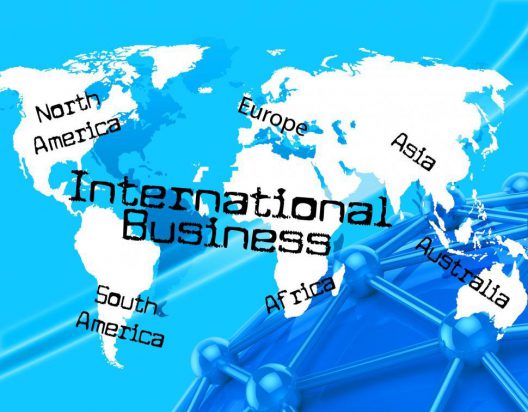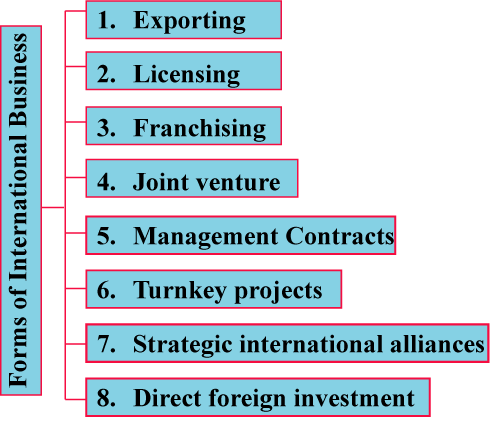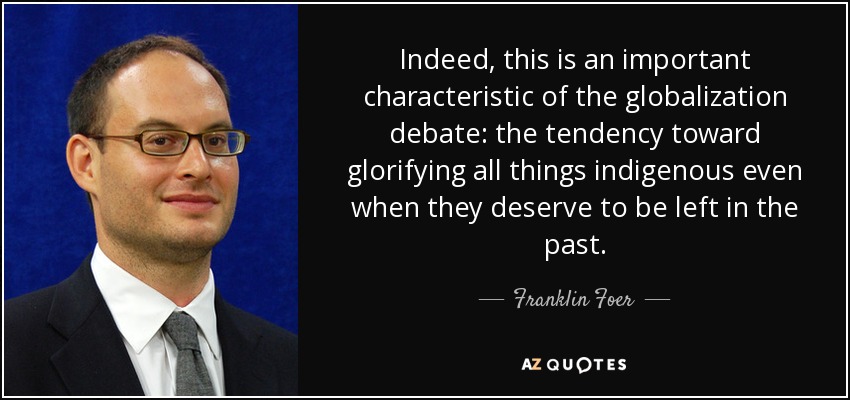What is international business?

The term “international business” describes a wide range of enterprises, from small local businesses to large multinational corporations. The study of international business deals with the governance and strategies of global business enterprises, as well as their relationship with governments and non-governmental organizations. It is a dynamic field, which examines the many complex issues that face global business enterprises. Students who are concerned with making globalization work for the good of society should consider taking up the subject.
One of the biggest reasons for pursuing international business is that it allows companies to tap into a diverse set of markets. Some companies have found that their home markets are saturated or small. Other businesses are finding that the domestic market is not enough. Whether a country is experiencing a recession or just a slow economy, international business provides a viable alternative to meet the challenges of a weakened domestic market. Developing countries, on the other hand, offer substantial growth opportunities. As populations and disposable incomes rise, multinational companies are seeking to expand into these economies. In addition, low-cost production facilities are a big plus for companies. Several countries, including India and China, offer low-cost production opportunities, which can help offset the rising costs of production at home.
“There’s no shortage of remarkable ideas, what’s missing is the will to execute them.” – Seth Godin
International business is also beneficial for the world economy. It helps businesses to buy materials and components at lower prices, enabling them to increase their profit margins and offer cheaper products to consumers. Furthermore, by bringing new markets into an existing one, companies can revitalize their current operations, gain fresh revenue and fight for their share of the local market. This is one of the biggest benefits of international business. The question of whether it’s beneficial for your business is an important one.
While many companies don’t want to take risks in the international market, some businesses do. In addition to lowering labor costs, foreign markets also offer significant growth potential. For developing countries, this is especially true due to the growing population and disposable income. Besides, many countries have lower labor costs, which makes it more attractive to multinationals. Moreover, low-cost production in developing countries is also an advantage. In addition, companies can reduce production costs in these countries, such as China and India.
What is international business? As the name implies, it involves the commercial transactions of companies between nations. These businesses may involve people, intellectual property, brand trademarks, data, and contractual assets and liabilities. It is crucial to consider the advantages and disadvantages of doing business across different borders. It is also possible to start a business in the developing world. If you choose to do business internationally, make sure you do your research. You should have a clear understanding of the nuances of global trade.
Who has an interest in international business?
International business is one of the most interesting areas of study, and it has many forms. There are several reasons why international business is so important today. From the global economy to the globalization debate, there is a large variety of businesses that have a presence abroad. And, those who are interested in making globalization work for good should consider studying international business. But, the question remains, who has an interest in international businesses?
Today, almost every company is affected by global competition, sourcing raw materials from abroad, or competing with products that are made abroad. As such, international business applies to all businesses, from small domestic companies to global corporations. The fact that each nation-state has a unique culture, government system, and currency makes international business more complex than domestic business. In addition, the disparity between national wealth continues to be large.
“The more that you read, the more things you will know. The more that you learn, the more places you’ll go.” ― Dr. Seuss
The term “international business” refers to the full range of exchanges between nations. These transactions involve people, intellectual property, brand trademarks, data, and contractual assets and liabilities. Stakeholder analysis, also known as “stakeholder mapping,” is one technique used to identify the key people, groups, and institutions that affect the global economy. However, the field of international business is not for everyone. There are many opportunities, including opportunities for careers and higher income.
What forms do international businesses take?
International businesses vary in their forms. While some focus on importing and exporting, others engage in both types of activities. They may also have significant operations outside their home countries, such as a joint venture or subsidiary. When it comes to international business, a firm can be categorized according to its purpose and scale. For example, a firm that imports and exports products have an international business in the country where they are produced. Similarly, a firm that focuses on selling products within its own country is an exporter.

There are many types of international business models. Exports are one form of international business. Other methods include joint ventures, turnkey operations, franchises, and strategic alliances. These methods can be effective depending on the nature of the business. If you’re thinking about expanding your business internationally, make sure you understand the different forms of international business. The following are just a few of the most common types. You should also be aware of each of these types.
International businesses can take many forms. For example, exporting is a common strategy for companies that want to expand their reach internationally. This means selling goods and services in foreign markets. However, this type of business is not appropriate for every country. Instead, it can be an excellent option for businesses with limited resources. While there are a number of other ways to do business abroad, the most common method is exporting. You can choose to do this directly or indirectly, through overseas sales agents and distributors.
What is the globalization debate?

Whether the world is flat is a major topic of the globalization debate. Critics of globalization call this perspective globaloney and say that globalization is the root cause of increasing inequality and the financial crisis. But a close look at this debate reveals a very different picture. It is not a simple issue to answer. In the end, it is very personal. As with any debate, there are both proponents and detractors.
The proponents of globalization argue that it is a good thing for the world because it promotes global economic growth and lowers prices for consumers. Many say that competition between countries drives down prices, but they also argue that countries manipulate their currencies to achieve a price advantage over each other. However, others believe that globalization is bad for the environment and that democracy should go hand-in-hand with globalization. Some say that multinational corporations have become corrupt, and are responsible for poor working conditions, slave labor wages, and environmental degradation.
A debate on globalization often centers on the speed of market integration. In the past, merchants moved precious items along ancient trade routes, including the Silk Road through central Asia. It was expensive and difficult to move goods over such distances. Even food was carted for long distances. Today, the globalization debate is a very stark contrast in opinions about the benefits and costs of internationalization. It is a major source of conflict in society, and it impacts national and cultural identities, as well as economic well-being.
What is the relationship between international business and ethics?

The relationship between international business and ethics is complex and a challenge to companies operating globally. Although ethical behavior is not a religious concept, many cultures are influenced by it. For example, the impact of religion on trade practices is different in Muslim and Christian countries. Some companies may not have the same ethical values as the ones in their own country. For this reason, a company must be careful about the ethical standards it adopts.
In international business, ethical standards are often the most important consideration, as varying cultural practices and legal norms can lead to problems and opportunities. As a result, executives must consider re-examining their assumptions about ethical business practice, especially when dealing with a foreign country. This may mean bending ethical rules to comply with different laws and cultural norms. In addition, there can be a difference in cultural norms, which can make it difficult for managers to conduct themselves in a global environment. Fortunately, ethics principles can guide managers through this maze of cultural differences and create global codes of conduct.
“Ethics is knowing the difference between what you have a right to do and what is right to do” – Potter Stewart
In general, the relationship between international business and ethics is complicated. The globalization of business has led to increasing transactions and globalization of markets. This has created practical issues and ethical concerns for many companies. The laws of the land address these problems, but it is the companies’ responsibility to understand the ramifications of their actions on the communities where they operate. Ultimately, ethics can impact a company’s bottom line, as well as its reputation.
As international business continues to expand, ethical standards must also evolve. A company that practices ethically is likely to be more profitable and attract more business partners. Even a company that has long been considered ethical can still be criticized for unethical activities. Despite its good reputation, however, there are examples of businesses that aren’t as ethical. The tech giant, Nikola, was found guilty of staged videos to show off its technology. Meanwhile, Wirecard suffered from an ethical crisis and has had to suspend operations.
In international business, ethical concerns can affect the quality of service. When the culture of a company is different from that of its local market, it is not likely to be ethical. In such a case, the company’s employees and customers might suffer from a lack of respect. For this reason, they should be aware of the different cultural standards in the region in which they operate. It is also imperative to protect children and prevent the use of child labor.
“If ethics are poor at the top, that behavior is copied down through the organization.” ~ Robert Noyce
While the issue of ethical behavior is not unique to international business, cultures, and ethics are often related. For example, bribery is widespread in many countries, but the ethical values of these companies are not the same. As a result, bribery is a widespread problem in international business. And, as a consequence, companies may not be able to detect it. As a result, ethical codes are essential to the success of businesses and their employees.
Analyze your country’s global competitiveness (WEF)
An article in the American Economic Review titled “Analyze Pakistan’s Global Competitiveness” shows that the country is not at all successful at competing with the world’s top nations. The economic crisis, which hit the country hard, has caused its trade deficit to swell. It has also prompted the government to consider a number of reforms, including improving its infrastructure and trade policies. Here are some tips for boosting Pakistan’s global competitiveness.

Educate the workforce: The number of school-age children in Pakistan has declined in recent years. As a result, schools are not providing adequate education to their citizens. This is especially true in urban areas. According to the World Bank, Pakistan has a poor record of education. Only a third of its population attends school. As a result, the country is far behind its peers in global education rankings.
Develop an economy that is resilient to natural disasters. In addition to climate-change impacts, Pakistan’s population is highly vulnerable to hazards. In 2016, a severe earthquake killed almost 73,000 people, damaged nearly 570,000 houses, and caused countless other disasters. The World Bank supports Pakistan’s efforts to develop a resilient economy by promoting anticipatory risk management. The organization initially provided technical assistance to highlight risks and conduct risk assessments of provincial and federal capitals.
Invest in education: In the last year, the government approved a $200 million Khyber Pakhtunkhwa Human Capital Investment Project. The funds are targeted at improving primary education and secondary education in four districts in Punjab. The money from the fund comes from the World Bank’s PESP-III program, which supports the education sector. By 2020, the provincial school participation rate will be 80%, which will mean more than 14 million children in public schools. Girls’ participation rates have also increased from 80 percent to 82% in the primary and secondary age groups.
“You have to stand guard over the development and maintenance of Islamic democracy, Islamic social justice, and the equality of manhood in your own native soil.”
― Muhammad Ali Jinnah
Health indicators have improved gradually, but not to the extent that they have been able to overcome the long-term challenges associated with globalization. In fact, the health of Pakistani children has improved remarkably in recent years. Among the most critical indicators, the state’s high-quality education system is a strong indicator of a country’s well-being. By promoting educational quality, the government is better able to compete with international companies.
Family planning has been one of the most important factors in improving Pakistan’s overall competitiveness. The total fertility rate, or TF, has decreased from four to three children in the last decade. Similarly, the mCPR has risen from 26% in 2013 to 25 percent in 2018. The project has been successful in boosting the country’s green transition. Achieving its goal of greening the economy is a key priority.
References:
Palomar College: https://www.palomar.edu/business/international/
International Relations: https://www.internationalrelationsedu.org/what-is-international-business/
India Free Notes: https://indiafreenotes.com/international-business-meaning-and-types/
Open Text: https://opentext.wsu.edu/cpim/chapter/1-8-the-globalization-debate
Lumen Learning: https://courses.lumenlearning.com/suny-internationalbusiness/chapter/reading-global-business-ethics/
Maryville: https://online.maryville.edu/blog/ethics-in-international-business/
WeForum: https://www.weforum.org/reports/the-global-competitiveness-report-2020



